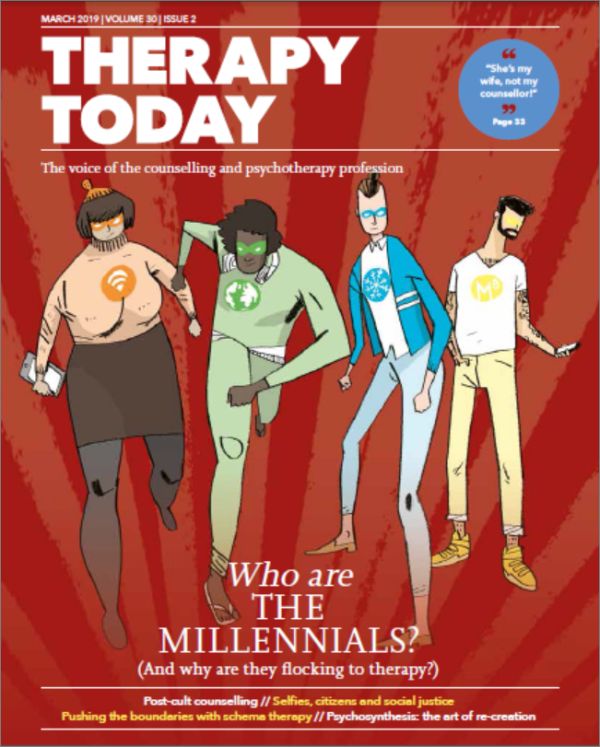In this issue
Here and now
News feature: Millennial me (free article)
What are today’s young adults bringing to therapy? Sally Brown reports
The big issues
Out in the world: post-cult recovery
Gillie Jenkinson explains her approach to working with cult survivors.
Mr Freeze and the lion
Catherine Ann Lombard describes how psychosynthesis can release a client‘s potential.
Attachment is key
Dan Roberts uses schema therapy to provide a secure base for very troubled clients.
Selves and citizens
Angela Keane asks how counselling can combat social injustice.
Regulars
Turning point
Helen Kewell draws wisdom from experience
Talking point
Benefits in the counselling room.
Research matters
Getting involved
Analyse me
Denise Cullington answers our questionnaire.
Your association
From the Chair
Andrew Reeves on employability
PRaCTICED: where now?
Kerry Ardern and colleagues report exciting developments in the PRaCTICED trial

Members and subscribers can download the pdf from the Therapy Today archive
Editor’s note
Did an overindulgent ‘therapy culture’ give us Donald Trump? So asks Angela Keane in her article, where she explores what a practice that is essentially individualistic, about personal growth and fulfilment, can contribute to the battle for social justice – and what it may have contributed to the state of the Western world today.
Social justice is a key issue for BACP and the topic of the international conference we are co-hosting in Belfast, in October, with the American Counseling Association and the Irish Association for Counselling and Psychotherapy. A key driver for this event is an awareness of the ever-present and increasingly urgent links between clients’ mental health and their experiences of oppression, poverty and/or discrimination, the three organisations say. As austerity bites and Western economies shudder in the face of world trade battles and Brexit, these issues are becoming ever more pressing and present in the counselling room, as this month’s Talking Point eloquently demonstrates. These counsellors certainly think engaging with these problems is unavoidable, if not essential: the therapist has to be genuinely open to and engage with what their clients bring. As Suzanne Keys says: ‘Counselling is also about how to... deal with the injustices of the system and all the questions of human nature and society that come with that.’ But what about action on the wider political stage? The call for social justice is about much more than ensuring everyone has equal access to counselling and psychotherapy. October’s conference will be a fascinating opportunity for these issues to be debated.
Catherine Jackson
Editor
I am surely not alone in being fascinated by how other therapists – and other therapies – work.
So I leapt on Dan Roberts’ feature on schema therapy and why he has adopted it as his main way of working with very troubled clients. It’s a fascinating insight into a ‘third-wave’ cognitive therapy and has given me plenty of food for thought. I hope you find it interesting too.
Many of us now take ideas from other modalities and absorb them into our own practice to work integratively, or sometimes eclectically. Some newer therapies may nudge us out of older ways of working; others may seem too strange or challenging even to contemplate. We have to balance such concerns with the importance of continually updating our knowledge and practice if our profession is to reflect new research findings and grow with the times. Of course, every development in every modality has to be underpinned by robust research but, as Aaron Balick says, we can’t shrink from breaking a few shibboleths for the right reasons.
Rachel Shattock Dawson
Consultant Editor
Disclaimer and copyright
